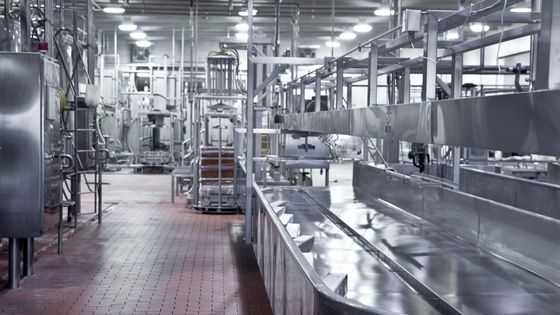Food processing involves the use of chemicals to treat food and allow them to last longer. Stainless steel lends itself perfectly to food processing and the wider food industry. It’s used for tubing for chemical transformation, work surfaces, tools, and much more. While there are other great metals out there, we’re going to take a look at why the food processing industry favors stainless steel.
Temperature Compatibility
Stainless steel is extremely versatile, meaning it can withstand extreme heat or cold temperatures. In the food processing industry, this is a great quality of stainless steel because it means it will never warp when used to manufacture heavy machinery. To give you an idea, type 304 stainless steel can withstand temperatures of up to 2550°F, after which it begins to melt. On the other end of the spectrum, stainless steel can withstand sub zero temperatures as low as -452°F.
Easily Fabricated
Stainless steel is much stronger than other metals including iron, but it’s much easier to manipulate into the desired shape. Whether it needs welding, cutting, or bending into shape, stainless steel will get the job done. The easy fabrication makes it perfect for manufacturing stainless steel sanitary tube systems, as well as small tools and larger appliances.
Durable
Stainless steel, by nature, has greater longevity than other metal options. It’s resistant to chemical corrosion and can withstand being battered over time. When other materials are used, food processing units find themselves constantly carrying out maintenance. Whereas, stainless steel will need fewer expert repairs, meaning more money in the budget to focus on smoothing out overall plant operations.
Hygienic
The food industry, including the processing sector, needs to keep food fit for consumption. This is why mountains of research have been carried out to measure the effect of stainless steel on food. So far, it’s been found that stainless steel does not degrade food and isn’t detrimental to human health.
As well as being harmless to human health, stainless steel has a chromium oxide film, which repairs damage. Further, this protective surface is resistant to chemicals, making it easy to clean. Non-absorbent qualities of stainless steel mean that it won’t build up bacteria, which is another reason stainless steel is perfect for food processing.
Chemical Resistant
There are many different grades of stainless steel, but they’re all considered chemical resistant, meaning that heavy-duty bleaches and degreasers can be used without deteriorating the metal. This is why you will find stainless steel in food processing plants, as well as other areas of the food industry including restaurant kitchens and countertops. Although it’s resistant to chemicals, high quantities of sulfuric acids, hydrochloric acids, and chlorides can corrode stainless steel, especially when exposed to adverse temperatures.
Stainless steel is highly versatile and sanitary, making it the perfect metal for food processing and countless other industries. If you believe stainless steel will solve problems in your food processing plant or factory, get in touch with industry experts to make sure there aren’t other alloys more suited.




















